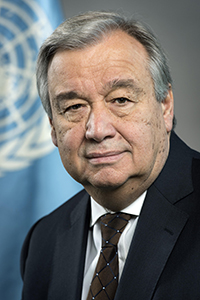
by arabnews.com — EPHREM KOSSAIFY — NEW YORK: Ahead of his visit to Lebanon next week, UN Secretary-General Antonio Guterres called on the country’s leaders to step up their efforts to root out corruption and promote accountability and transparency. “Lasting solutions can only come from inside Lebanon,” he said on Friday in a video message. “It is essential for leaders to put the people first and implement the reforms needed to set Lebanon back on track, including efforts to promote accountability and transparency, and root out corruption.” Guterres expressed his concern for the Lebanese people and the hardships they are facing. He praised them for their “generosity, resourcefulness and hospitality,” qualities he said he has seen first-hand during his visits to the country as head of the UN Refugee Agency.
Lebanon faces multiple crises. In addition to an ongoing financial and economic collapse, it is struggling with the effects of the COVID-19 pandemic and still reeling from the devastating explosion at Beirut’s port on Aug. 4 last year, which claimed more than 200 lives, injured more than 6,000, left many more homeless and cost the country up to $4.5 billion in damages. “The United Nations mourns with you,” Guterres told the Lebanese people. “Among the youngest victims were two children of UN staff members.” The explosion happened when a large amount of ammonium nitrate, stored at the port for six years without proper safety precautions, ignited. Tensions remain high in Lebanon over the investigation into the blast, and last month this spilled over into street violence that left at least six people dead. Activists and relatives of the victims say that the official inquiry is being hampered by the Lebanese political leadership in an effort to shield politicians and officials from scrutiny. “I know the Lebanese people want answers and I hear your demands for truth and justice,” Guterres said.
In June the World Bank published a report titled “Lebanon Sinking to the Top 3,” in which it ranked the Lebanese crisis in “the top 10, possibly top 3,” most severe global crises since 1850. The scale of the economic and financial crisis in the country is the result of “a lack of any policy action whatsoever by those who are responsible for taking policy action,” according to Kumar Jha, the regional director of the Mashreq department at the World Bank Group. “Next year’s elections will be key,” said Guterres, who will meet a number of Lebanese leaders and politicians, including President Michel Aoun, Speaker of Parliament Nabih Berri, and Prime Minister Najib Mikati, “to discuss how we can best support you to overcome the crisis and promote peace, stability, justice, development and human rights.” He added: “Lebanon’s people must be fully engaged in choosing how your country moves forward. Women and young people must have every opportunity to play their full part. “This is the only way Lebanon will lay the foundations for a better future. I look forward to spending time in the Land of the Cedars.”



